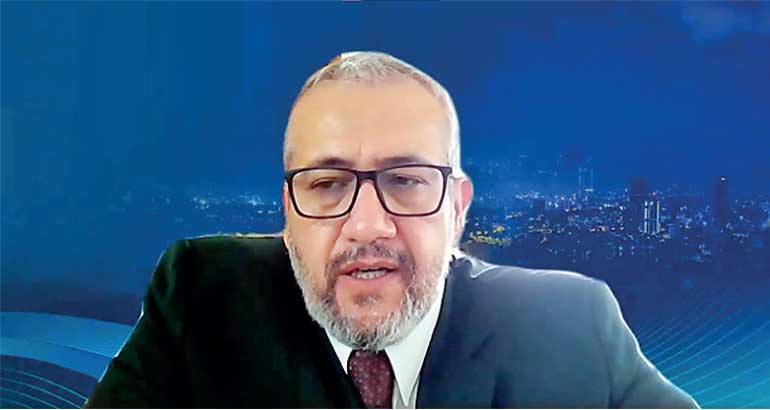Thursday Feb 26, 2026
Thursday Feb 26, 2026
Wednesday, 9 June 2021 00:05 - - {{hitsCtrl.values.hits}}

World Bank Country Director Faris Hadad-Zervos
World Bank Country Director Faris Hadad-Zervos on Monday expressed confidence in Sri Lanka’s ability to realise its true potential in several priority sectors and niche industries and overcome the pandemic, provided supportive policies are ensured.
He said Sri Lankan companies in apparel, entrepreneurial dynamism in niche sectors like ICT and high-tech products have expanded their manufacturing footprint globally and have moved up the value curve to more sophisticated products and markets.
“Policy makers must create an ecosystem to tap into these innovative drivers and large existing manufacturing sectors to fully harness Sri Lanka›s competitive advantage that is integrated further into global market value chains,” Hadad-Zervos told Sri Lanka Investment Forum (SLIF) panel discussion titled ‘Charting Sri Lanka’s Economic Trajectory’.
The World Bank Country Director said Sri Lanka can capitalise on these sectors that have scaled up with the latest technologies and hold the potential to drive Sri Lanka›s transformation.
Highlighting the huge potential to rebuild the tourism industry post-COVID, he insisted on important factors such as greener measures, improved logistics, connectivity, addressing shortages of skills and to build up service-oriented workforce.
Hadad-Zervos also said Sri Lanka›s distance to the frontier remains vast and it was not a shortcoming, but rather a massive growth potential.
“Sri Lanka’s targeted $ 5 billion FDI by 2025 is entirely doable and realistic, given its rich natural resources —strategic location, high literate workforce, opportunities for investment in tourism, ICT-enabled services, logistics, highly valued apparel and food services. If and when the right combination of things are in place, this becomes an ideal time to invest,” he added. However, he pointed out that this ultimately rests on a collective set of policies and practices that make up an investment ecosystem, ranging from improvements of the investment climate, elimination of unnecessary regulatory burden. “What we have seen in other countries is that investment promotion is the beginning of the story and not the end. The name of the game is attracting and retaining the efficiency seeking FDIs.
It is important to enhance the predictability of laws and responsiveness of the bureaucracy to deliver effective FDI services,” he said. Noting that governments world over are grappling to have a balanced fiscal sustainability to jumpstart the economic recovery post-pandemic, World Bank Country Director called on the Government to keep the momentum on global integration. “Let’s put export earnings as a percentage of GDP as a key measure to follow, but that requires constant touch ups on policies that are predictable. We have to look at the rule of imports, where it helps exports. If there are imports that help exports, we must allow them,” Hadad-Zervos said in apparent reference to on-going restrictions on imports. (CdeS)
